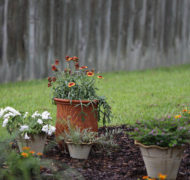The Work of a Landscaper
Blog / Produced by The High Calling
The lithadora spangles and sparks blue. Along the homeowner’s driveway, a phalanx of golden bamboo bows and hushes. Some summers it crawls with tiny red mites and managing the escapees involves kneeling on cane stubs, hard and sharp as broken metal pipe.
We write, my husband Jeffrey and I, and this calls for flexibility in terms of time management. For now, I am the movable piece and this seasonal, weather-driven employment is how I manage my part.
I think of myself not so much as a landscaper, with its nuance of design and control, as one who labors to keep a kind of wild order. This client lets arugula go to flower because it attracts butterflies. Reeds go supernova. Irises rattle the last few coins in their purses. This wild abandon will add hours to my work come Spring.
I picked up my first gardening job one year while looking for a few extra hours to supplement my income from a job at a downtown research lab. I can do this, I thought, recalling long summers weeding the massive vegetable gardens my parents had. It’ll provide solitude, exercise, and mental space to work on poetry. Mostly true, resoundingly true, and not so much true.
I’m still waiting for the day when I find myself pondering broken meter and slant rhyme while shaping the shrub willow. So far, as I yank up duckweed, what my mind tells me is you missed one and that’s an unnaturally large banana slug, better break out the beer.
I know well enough that during mating season certain species of brown garden spiders get cranky and bite. In October, my socks are perpetually wet. Frost-crusted sod resists the trowel in January.
Still, it’s easy to romanticize. But it is hard physical work with its accompanying calluses and cramped muscles. It is also the choir of humming as the mason bees choose their blooms. The towhee hinges and scrapes out a love song and hummingbirds zip and unzip the afternoon. It is the pause to straighten the back and a long look out across the water to the islands. It is sweat in every crease of the body and red eyes in allergy season. It is a glimpse of heaven as I ease down a slope toward the water and into a fog that smells like salt. As the morning lengthens, the mist sinks back to the level of the Sound and bares a shoulder of mountain. These are the days when I understand the need to place a sword in the hand of the angel, so badly do I want to remain here, among beauty.
We are fragile and perishable, like wildflowers, like grass. The wind picks up and Hakonechloa macro ‘Aureola’ bends its thousand striped backs. Lady’s Mantle knits insignificant green flowers and cradles cut glass beads of rain in its velvet, scalloped leaves.
It’s not forever. In fact, I never planned to keep at it this long. My knees crackle when I descend stairs and get stiff in winter. Occasionally I get bored. It beats a cubicle, though. The textures of botanical nomenclature satisfy my mouth, and quiet accompanies me most days, a thing I need in spades.
Before I leave for the day, I knock mud off a shovel and consider what’s been accomplished. I tend what will pass away and be forgotten—the frost-blasted aloes and the drought-singed hebe. What I prune or pull up will try again, both vetch and sedum. The vetch is a knotted fretwork of stems descending to a spindly sole support, easily snapped and hiding root threads that splay and fissure out of sight and produce a second growth. Tendrils reluctantly release the shrub beneath it. The lips of the purple flowers that accept only specifically shaped insects now close up. Leaflets froth across my fingers, light as a wren feather, smelling like fresh garden peas where the flesh is bruised. I trudge through the transitory and transcendent with the last bucketful for the compost, ankle-deep in glory and dust, a witness to the exquisite attention given by its Creator to the smallest weed.
Post by Anne M. Doe Overstreet, author of Delicate Machinery Suspended





